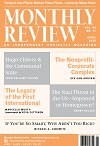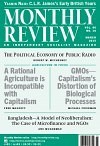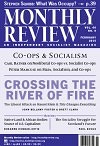Americas
Manufacturing America’s Dreams
Auto companies shield their low-tech exploitation of workers behind high-tech displays of mechanical prowess. The less a consumer knows about the blood and guts of manufacturing, the easier it is to buy the dream. So how does America think all this crap gets built?… Last summer, in a desperate attempt to entice young viewers to buy grandpa’s dream car, General Motors (GM) ran a TV ad that featured a chorus line of robot arms dancing to techno music around a series of Cadillacs strutting like runway models on chrome-plated wheels.… Don’t let yourself be seduced and deluded. The auto industry’s master talent isn’t robotics, it’s the ability to automatize humans—including drivers. | more…
My Enemy’s Enemy Is My Friend
Like many other leftists working in labor or community organizations, I have long struggled to understand the role I can play in building a larger left movement. I have spent nearly a decade organizing for the Service Employees International Union (SEIU) and have only recently caught a glimpse of what a vibrant and popular leftist practice could look like.… In this analysis, I take inspiration from Antonio Gramsci’s ideas. He described a “war of position”—a protracted revolutionary effort to create an anti-capitalist hegemony—as a methodology for anti-capitalists in advanced industrial countries. Counter-hegemony is a process, built by concrete effort both through political education and political action. As a labor union organizer, I have become quite skilled at political action, but not at political education.…One alignment of organizations in Minnesota—Minnesotans for a Fair Economy (MFE)—has the potential to be part of such a counter-hegemonic process. On a day-to-day basis, member organizations of MFE organize people to confront their bosses and banks, as well as the corporations holding back their communities. On a sporadic basis, the member organizations come together to create a new narrative of what kind of a world we want.… It was in a MFE “week of action” that I first began to understand how the process of creating a counter-hegemony might play out in practice. | more…

April 2015 (Volume 66, Number 11)
The Review of the Month in this issue (“Chávez and the Communal State” by John Bellamy Foster) focuses on the revolutionary political strategy introduced by Hugo Chávez and the Bolivarian movement in Venezuela. In the process it addresses how István Mészáros’s Beyond Capital played a key, strategic role in the development of Chávez’s thinking. Beyond Capital is a daunting philosophical work of around a thousand pages, while many of his other writings are nearly as challenging. MR readers will therefore be pleased to learn that we have just published a new book by Mészáros, The Necessity of Social Control (Monthly Review Press, 2015), expressly designed, as Foster writes in the book’s “Foreword,” as “an easily accessible work,” providing “a way into his thinking for the uninitiated” (9).… Yet, Mészáros’s new book is much more than that. | more…
Chávez and the Communal State
On the Transition to Socialism in Venezuela
On October 20, 2012, less than two weeks after being reelected to his fourth term as Venezuelan president and only months before his death, Hugo Chávez delivered his crucial El Golpe de Timón (“Strike at the Helm”) speech to the first meeting of his ministers in the new revolutionary cycle. Chávez surprised even some of his strongest supporters by his insistence on the need for changes at the top in order to promote an immediate leap forward in the creation of what is referred to as “the communal state.” This was to accelerate the shift of power to the population that had begun with the formation of the communal councils (groupings of families involved in self-governance projects—in densely populated urban areas, 200–400 families; in rural areas, 50–100 families). The main aim in the new revolutionary cycle, he insisted, was to speed up the registration of communes, the key structure of the communal state. | more…
The Nonprofit-Corporate Complex
An Integral Component and Driving Force of Imperialism in the Phase of Monopoly-Finance Capitalism
According to Michał Kalecki, the imperialist system of the Keynesian era rested on a triangular structure that was composed of (a) state-financed military production (i.e., the military-corporate complex, often called the “military-industrial complex”), (b) media propaganda (media-corporate complex), and (c) a putative full-employment/welfare-oriented superstructure (Keynesianism) underpinned by the war machine, serving to justify it. Building on Kalecki’s work, John Bellamy Foster, Hannah Holleman, and Robert W. McChesney provided an updated version of the theory of imperialism of the monopoly-capital tradition by laying emphasis on the primary role of the above triangle in the restructuring and preservation of the contemporary imperialist system.. Expanding on their work, I argue that one of the most significant changes in the triangular structure of contemporary imperialism is in its third pillar, particularly with the abandonment of the welfare-oriented paradigm and the adoption of the neoliberal globalization project. | more…
Trying to love Pilgrim Nuclear Power Plant
Marge Piercy is the author of eighteen poetry books, most recently The Hunger Moon: New & Selected Poems, 1980–2010 (Knopf, 2011). Her most recent novel is Sex Wars (Harper Perennial, 2005) and she has just published her first collection of short stories, The Cost of Lunch, Etc. (PM Press, 2014). | more…
The Nazi Threat in the United States
Imported or Homegrown?
Fascism has come full circle…. The main sponsor of this regime this time is not Nazi Germany but Washington…. U.S. military adventures in the Middle East and Africa [and the] [r]esort to imperialist wars abroad also reflects growing social polarization at home, the hollowing out of U.S. liberal democracy as a result of the power of money, the gigantic expansion of the security and surveillance state, the spread of armed vigilantism, the intensification of racism, and the militarization of the U.S. police.… What we are likely witnessing is a situation in which it is no longer possible for the capitalist class in crisis to rule the people of the United States in the old way. A process is underway that involves the withering away of liberal democracy and the arrival of a not-so-friendly fascist order meant to bolster capitalism through a resort to authoritarian discipline. How far this process goes depends on political events and the effects of the ongoing economic crisis on public consciousness. | more…

March 2015 (Volume 66, Number 10)
Notes from the Editors
From its earliest years, Monthly Review has been distinguished among socialist publications by the degree to which it has incorporated environmental views into its fundamental perspective. Paul Sweezy’s 1950 article, “An Economic Program for America”…listed conservation of natural resources and the elimination of destructive waste as two of the primary goals in the development of socialism. He called for the socialization, long-term planning, and conservation of “coal…oil and natural gas and all the other fuels which provide the lifeblood of modern industrial society.” Scott Nearing’s monthly column “World Events,” written for MR from the early 1950s to the early 1970s, regularly examined environmental, along with political-economic, developments. Nearing was a socialist economist and environmentalist.… With the publication of Rachel Carson’s Silent Spring in 1962, Nearing explored its wider ecological implications, contending that civilization had entered the “phase of suicidal destructivity…. Without doubt man has built a pyramid of potential destructivity…. Man is a destroyer as well as a builder. He has exterminated entire species…. He has destroyed forests and opened the soil to erosion. He has engaged in fratricidal wars that have wiped out one civilization after another and presently threaten to end western civilization” (Nearing, “World Events,” Monthly Review, November 1962). | more…
The Personal Is Political
The Political Economy of Noncommercial Radio Broadcasting in the United States
In this essay, I look at the problems facing progressives and those on the political left in the United States in participating in political analysis and debate in mainstream journalism and the news media. I focus on radio broadcasting, as this is where much of political discussion takes place in the United States. Radio broadcasting is the least expensive of the media for production and reception, is ubiquitous, has adapted itself to the Internet, and is uniquely suited for locally based programming.… I look specifically at my own experience hosting a weekly public affairs program on an NPR (National Public Radio)-affiliated radio station in Illinois from 2002–2012. This was, to my knowledge, the only NPR series hosted by a socialist in the network’s history. | more…

In Walt We Trust: How a Queer Socialist Poet Can Save America from Itself
Marsh identifies four sources for our contemporary malaise (death, money, sex, democracy) and then looks to a particular Whitman poem for relief from it. He makes plain what, exactly, Whitman wrote and what he believed by showing how they emerged from Whitman’s life and times, and by recreating the places and incidents (crossing Brooklyn ferry, visiting wounded soldiers in hospitals) that inspired Whitman to write the poems. Whitman, Marsh argues, can show us how to die, how to accept and even celebrate our (relatively speaking) imminent death. Just as important, though, he can show us how to live: how to have better sex, what to do about money, and, best of all, how to survive our fetid democracy without coming away stinking ourselves. The result is a mix of biography, literary criticism, manifesto, and a kind of self-help you’re unlikely to encounter anywhere else. | more…

February 2015 (Volume 66, Number 9)
Notes from the Editors
John Cassidy, who writes on economics for the New Yorker, is in our view one of the most interesting anhd creative commentators on economic analysis and trends writing in the mainstream today. His perspective might be best characterized as institutionalist-realist, in the tradition of thinkers like Thorstein Veblen, John Kenneth Galbraith, and Hyman Minsky.… Cassidy’s latest critical contribution is an online New Yorker news item published on December 12, 2014, carrying the rather prosaic title, “The Winner of the Spending Bill Vote: Jamie Dimon.”… [In this piece] Cassidy…explain[s] how the spending bill passed by the House of Representatives included a rider that rolled back regulations that had been imposed after the Great Financial Crisis on some of the riskier activities of banks. Such speculative activities were to be transferred to the unregulated bank subsidiaries not covered by the federally guaranteed bank insurance system. This has now been reversed and banks are again allowed to engage directly in such high-risk speculative activities, with the losses being picked up by the general public.… There is no doubt that Cassidy is correct, and that the analyses of “left-left” thinkers like Sweezy, one of Monthly Review’s founding editors, and Chomsky, an MR author, have been generally on the mark in pointing out that such outcomes are to be expected in the state management of the economy. | more…